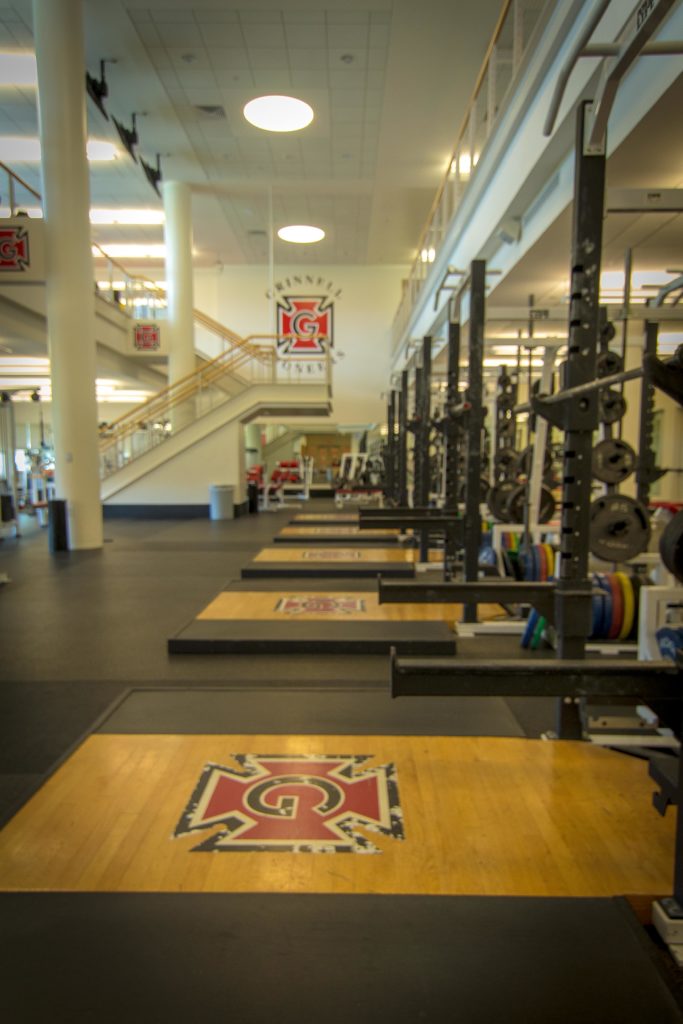
The Grinnell College Athletic Department and student-athlete group Queer Athletes and Allies (QAA) are launching an initiative to make the Bear Athletic Center more accessible for students.
“A lot of things in the Bear [Athletic Center] needed to be improved, in general. But also more importantly, we [Grinnell College Athletic Department] needed to be better communicators about what’s available and resources that are there” said Ben Cooprider, assistant athletic director. Cooprider oversees the facilities of the College’s athletic department.
Last semester, QAA held a town hall meeting about the Bear Athletic Center.
“Over the years, people from the queer community felt very uncomfortable going to the Bear,” said Polly Carr ‘18, co-leader of QAA. “We wanted to bring the Grinnell community together to talk about the ways that we could improve the Bear for everyone.”
Though the meeting was initially about inclusivity in the Center, Carr and Cooprider noticed that the issues students raised were just as much about inclusivity as they were about the lack of access to information about the building.
“It evolved from issues about inclusivity in the Fitness Center to broader picture,” Cooprider said.
Cooprider admits that many of the Center’s policies have not changed. He and Holly Roepke, the assistant athletic director/coordinator for diversity and inclusion and student programming, focused more on improving communication.
In addition to creating a Facebook page and Twitter account for the Center, they produced information guides, outlining the dress code, the types of locker rooms available, location and rules of all the facilities. The guide can be found in the Bear Athletic Center and on the Grinnell College Athletic Department website.
The biggest change is adding Pioneer card access to the second floor of the Fitness Center, allowing people to have access to cardio machines without having to walk through the lower floor lifting section.
Other changes, as outlined in a campus-wide email from the Student Government Association (SGA), include the “use [of the] doorway at east end of West Corridor for access to the saunas and pool deck without requiring walk-through of gendered locker space, highlight[ing] the ‘Family Locker Room’ on the Pool Deck as an option for a gender inclusive locker room, post[ing] etiquette signs around the Fitness Center to help improve the safety and sanitary condition of the weights and squat racks.”
The first email sent out about the changes had one error as it claimed that, “no coach-organized team lifts will happen during the peak hours in the Fitness Center (4 to 7 p.m. on weekdays).”
Cooprider clarifies that only “testing sessions”, which are mandatory lifting sessions for some sports teams that occur only about twice a semester, will no longer occur during between the busy hours of 4 p.m and 7 p.m. on weekdays.
“We [the Athletic Department] are not telling our varsity athletes that they cannot lift on their own. Because as coaches at NCAA Division III level, we have no oversight with our student athletes during the off season,” Cooprider said. “If an influx of them comes in at four o’clock on a Tuesday, just as any student would, there’s nothing we’re going to do about that.”
Carr and Cooprider think that these measures are a “step in right direction.” Both want feedback from students to further improve the space.
“If the changes are counterproductive or not helpful, we [QAA] have our ears open,” said Whitney Teagle ’18, another co-leader of QAA.
Cooprider also admitted that some suggestions are not feasible. One of the most popular proposals at the town hall meeting was to make trainers available for non-student athletes. Because of liability and monetary reasons, such a request is not possible.
Well before the town hall meeting, Andy Hamilton ’85, director of athletics and recreation, began his search for a new assistant athletic director for diversity and inclusion, elevating the position from its previous coordinator status to a director role.
“The professionals we hired were staying about a year to a year-and-a-half and moving onto higher level positions. I was looking to create better continuity,” Hamilton said. During spring 2017, he hired Roepke.
“Inclusivity is a core value of the college,” Hamilton concluded. “I am pleased that in this particular case, there was a dialogue and there were some positive changes toward that end.”
The leaders of QAA can be reached through the group’s email, qaa@grinnell.edu. Cooprider encourages students to make an appointment with him or Holly Roepke to discuss any remaining issues with the Bear Athletic Center.



















































